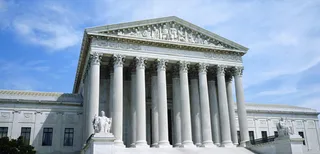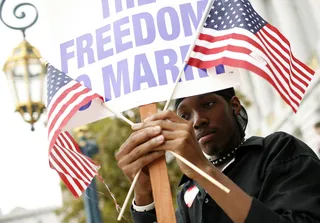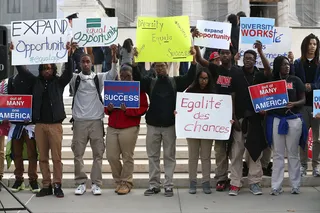Five Current Supreme Court Cases You Should Know
Civil rights, gay marriage and more issues take focus.

1 / 11
Weighing the Facts - BET.com takes a look at five cases the U.S. Supreme Court is expected to hear this year and their potential impact on the African-American community. — Britt Middleton (Photo: GettyImages)
Photo By Bruce Byers/Getty Images

2 / 11
The Case: Shelby County, Alabama, vs. Holder; Nix vs. Holder - This case centers on the constitutionality of Congress' 2006 decision to re-authorize a provision in the Voting Rights Act of 1965, which allows government oversight over states with a history of voter discrimination. Sixteen states are currently covered in the provision, meaning they must get approval from the U.S. Justice Department before making changes to any voting rules. (Photo: Edward Linsmier/Getty Images)

3 / 11
The Impact - If the Supreme Court doesn't reauthorize the provision, a number of highly controversial voter ID laws could be passed in these governed states, potentially disenfranchising countless voters, with low income voters, students, the elderly and racial minorities being among the most vulnerable.(Photo: Mario Tama/Getty Images)

4 / 11
The Case: Arizona vs. The Inter Tribal Council of Arizona, Inc. - Voter ID laws in many states became a focal point of the 2012 election, with critics claiming they were intended to suppress the votes of minorities, the elderly and low-income individuals. In Arizona vs. The Inter Tribal Council of Arizona, Inc., the Supreme Court will rule on the legality of an Arizona law that requires anyone registering to vote in the state to prove that they are U.S. citizens, potentially violating the National Voter Registration Act (1993). (Photo: David McNew/Getty Images)

5 / 11
The Impact - The case requires the Supreme Court to weigh the roles of state governments and Congress in regulating election procedures. "What these laws do accomplish is disenfranchisement; even conservative estimates suggest that they prevent 2 to 3 percent of registered voters from casting a ballot," writes Ian Millhiser of ThinkProgress.org. (Photo: J.D. Pooley/Getty Images)
ADVERTISEMENT

6 / 11
The Case: Hollingsworth vs. Perry - Same sex-marriage has become a hot button issue both politically and socially, with many states passing measures allowing gay marriages in recent months. In 2008, voters put same-sex marriages on hold in California by approving Proposition 8, which defines marriage between one man and one woman. (Photo: REUTERS/Robert Galbraith)
Photo By REUTERS/Robert Galbraith

7 / 11
The Impact - By striking down Proposition 8, California would join nine states and Washington, D.C., as places where same-sex unions are legal. Civil rights leaders, including Jesse Jackson, have described same-sex marriage as the next great civil rights issue and the Obama administration has publicly backed Proposition 8's repeal. (Photo: Justin Sullivan/Getty Images)

8 / 11
The Case: Fisher vs. University of Texas at Austin - Abigail Fisher, a white applicant, sued the University of Texas at Austin in 2008, claiming that her race played a part in why she was not granted admission into the school. The case calls into question the precedent set in Grutter v. Bollinger (2008), in which the Supreme Court ruled that race can play a limited role in the admissions policies of universities. (Photo: Mark Wilson/Getty Images)
Photo By Photo: Mark Wilson/Getty Images

9 / 11
The Impact - If the Supreme Court rules in favor of Fisher, the ruling could have a ripple effect for other universities that employ affirmative action in their admission process. Affirmative action policies in employment, business and education were enacted in the 1960s to benefit underrepresented groups with regards to race, nationality, gender, sexual orientation and religion. (Photo: REUTERS/Gregory Shamus)

10 / 11
The Case: Maryland vs. King - After Alonzo Jay King Jr. of Maryland was arrested for assault in 2009, police took a cheek swab that would eventually link his DNA to an unrelated rape case. Maryland vs. King centers on whether police violated King’s privacy rights by taking the DNA without a search warrant, thus violating the Fourth Amendment, which protects citizens from unreasonable searches and seizures. (Photo: Scott Olson/Getty Images)
